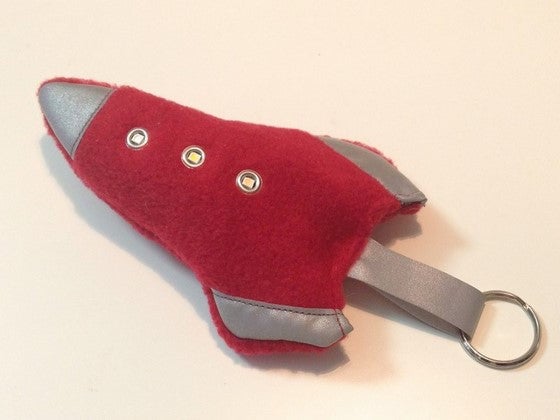Description
Reach for the stars with this rocket key ring torch. The torch uses reflective fabric to help you find your keys in your bag in low light conditions.
It also has 3 LEDs that light up with a push switch concealed in one of the rocket wings. As well as the push switch, the rocket is made using a mini cell holder and PCB LEDs in white, blue and sakuru.
The LEDs sit inside metal eyelets along the body of the rocket, which is also slightly padded and sewn together on a sewing machine. The battery pack can be accessed via a gap on the base of the rocket, which is where the key ring attachment can be found.
The circuit requires some previous knowledge of E-Textiles as well as some basic textiles knowledge.
A fleece fabric has been used for the main body of the rocket but other fabric could be used.
Learn how to:
- Create a circuit using 3 PCB LEDs.
- Use a Miniature Coin Cell Holder.
- Add a separate switch to a circuit (push switch).
Level of difficulty:
- Beginner.
Parts list
In order to make your Sewable Rocket Key Ring Torch, you will need:
- Miniature Coin Cell Holder.
- PCB LEDs in blue, white and sakuru.
- Push switch.
- Conductive thread.
- CR1220 3V Coin Cell Battery.
- Approximately 30cm x 30cm fabric e.g. fleece.
- Approximately 10cm of 5cm wide tape sew in reflective tape (this could be replaced with other materials).
- Key ring.
- 3 metal eyelets big enough for the LEDs to poke through.
- Stuffing.
- Sewing thread to match fabrics.
- Small popper.
Please note that the Electro-Fashion components are also supplied in retail pack form: Electro-Fashion Deluxe E-Textiles Pack. This pack is also supplied with an instruction booklet.
You will also need the following equipment:
- Sewing machine.
- Large eye e-textile needle.
- Paper template for the rocket.

Step-by-step guide to making a rocket key ring torch
Step 1

Use the rocket pattern to cut out 3 rocket shapes in the main fabric. Two of these will form the front and back of the rocket, with the third shape being used as the layer the circuit will be stitched onto.
This third shape will be sandwiched between the front and back layers.
Also cut 2 wings and a nose cone in the reflective sew in tape.

Use the pattern template to mark the position of the metal eyelets onto the rocket front.
Attach the eyelets according to the manufacturer’s instructions.

Stitch the nose cone and wings into position on the front of the rocket using a sewing machine.
Step 2

Lay the front of the rocket on top of the rocket shape which will have the circuit on it, and mark off the position of the eyelets using a specialist fabric pen.

Turn the bottom edges of the front and back rocket pieces to the inside by 0.5cm and stitch with the machine.
Step 3

Cut a piece of reflective tape approximately 1cm x 5cm. Slide the key ring over the fabric and fold in half to make the key ring hanger.

Machine the key ring hanger onto the inside of the turned edge on the bottom of the rocket.
Step 4

Position the blue LED on top of the top mark on the circuit layer of fabric. Oversew the negative side of the LED into position using the conductive thread.
Make sure the stitches are tight to ensure a good electrical connection.

Use small running stitches to take the thread to the position of the next LED (white).
Oversew the negative side of the LED into position.

Use small running stitches to take the thread to the position of the final LED (sakuru) and oversew the negative side of the LED.

Use small running stitches to take the thread to the position of the mini cell holder and oversew the negative side of the cell holder. The negative side of the circuit is now complete.
Step 5

Using a new piece of conductive thread oversew the positive side of the LEDs into place starting with the blue LED.

Use small running stitches to take the thread to the position of the push switch. Oversew one side of the push switch into position.

Use a new piece of conductive thread to oversew the other side of the push switch into position.
Use small running stitches to take the thread to the positive side of the cell holder and oversew it into place. The circuit is now complete.
Note, the remaining two holes on the cell holder are not used in this circuit. They can be left loose or held down using an ordinary sewing thread for stability.
Step 6

Push the cell into the holder with the positive side facing upwards.

Check the circuit works by pressing the push switch.
Lay the circuit layer of fabric under the rocket front pushing the LEDs through the metal eyelets. A small amount of fabric glue can be used to hold the circuit layer in position against the rocket front.
Step 7

Lay the back of the rocket on top of the rocket front with the right sides of the fabrics facing each other. Use the sewing machine to stitch the fabric layers together 0.5cm from the edge. Carefully cut off any points and corners to help them lie flat when the rocket is turned the right way round.
Turn the rocket to the right side out by pushing out the nose cone and wings with a pointed object.

Hand sew the popper into position on the rocket opening.

Lightly stuff the rocket to give it shape.
Step 8

Enjoy your new rocket key ring torch!
Download a pdf version of this page here. ![]()
Download the cutting pattern here. ![]()
This tutorial was produced for Kitronik by Julie Boyd who is a specialist in E-Textiles design.




